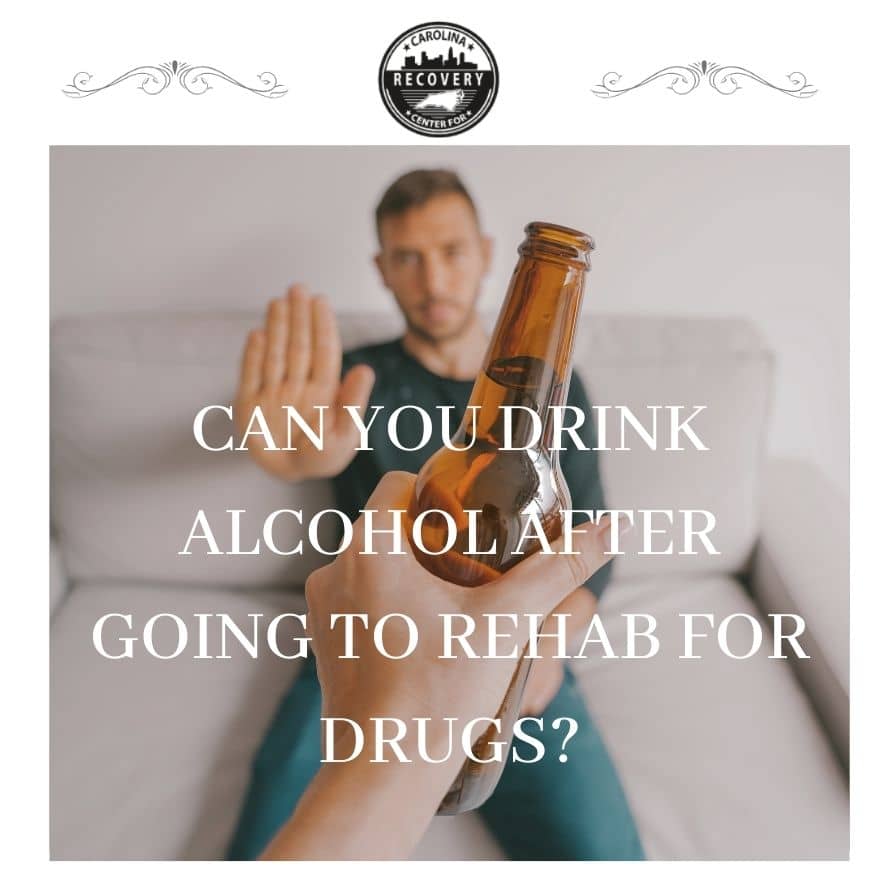Can You Drink Alcohol After Going to Rehab for Drugs?

Medically Verified: 2/1/24
Medical Reviewer
Chief Editor

All of the information on this page has been reviewed and verified by a certified addiction professional.
Alcohol can be found almost anywhere, from work dinners to life celebrations and even casual gatherings with your family. If you’re in recovery from drug addiction, you might find yourself wondering whether you can drink after getting sober from illicit drugs. After all, many people can drink without becoming an alcoholic, so why can’t you?
Total abstinence is the best way to recover from addiction. Even if your drug of choice was cocaine or an opioid, you should not drink alcohol. But why?
Understanding the risks associated with drinking alcohol after going to rehab for drug addiction can prevent you from experiencing a relapse.
Should You Drink Alcohol After Drug Rehab?
From beer commercials to bottomless mimosa brunches, it’s easy to feel like alcohol is everywhere. This can make someone recovering from a drug addiction think that drinking alcohol in recovery is not a big deal. Very few people can moderate their alcohol consumption after recovering from drug addiction, and attempting to do so comes with a myriad of risks.
The two main risks of drinking alcohol as a recovered drug addict include:
Cross Addiction and Transfer Addiction
Cross-addiction (addiction interaction disorder) is a term that describes being addicted to two or more substances or behaviors. While these addictions can occur at the same time, they can also replace one another–something called transfer addiction. Transfer addiction occurs when you trade one type of addiction or addictive behavior for another. For example, if you recovered from opioid addiction and later developed an addiction to alcohol, you would meet the criteria for a cross-addiction.
Alcohol-Induced Relapse
If you drink alcohol in recovery from drug addiction, you could experience an alcohol-induced relapse, which occurs when drinking alcohol triggers drug use.
When you drink alcohol, your inhibitions become lowered, and you are more likely to make choices that you wouldn’t when you are sober. This can be incredibly dangerous for someone recovering from drug addiction because you could become tempted to abuse drugs.
How to Assess Your Relationship With Alcohol
If you are drinking alcohol while in recovery from a drug addiction, it’s important to assess the relationship you have with alcohol. Doing this sort of “self-assessment” can help you determine whether your drinking is becoming a problem.
When assessing your relationship with alcohol, ask yourself the following questions:
- Why am I drinking alcohol? Is it to cope with uncomfortable feelings?
- How often do I consume alcohol?
- Can I stop or moderate my drinking?
- How do I feel when I’m unable to drink alcohol?
- How important is it for alcohol to be present during social situations?
- Is alcohol affecting my relationships?
- Am I experiencing adverse effects from drinking alcohol?
- Have I been spending more time or money on drinking alcohol than I intended?
- Have I had to increase the amount of alcohol I drink to experience the desired effect?
- Does alcohol cause me to experience cravings for other drugs?
- Do I get into risky situations when I drink alcohol?
If you find that you are using alcohol to cope with negative emotions, are unable to control the amount you drink, or have built a tolerance, you might be developing a cross-addiction.
According to the National Institute of Alcohol Abuse and Alcoholism, “Alcohol use disorder (AUD) is a medical condition characterized by an impaired ability to stop or control alcohol use despite adverse social, occupational, or health consequences.” If this sounds familiar, you could be suffering from an addiction to alcohol.
On the other hand, if alcohol is causing you to get into risky situations or experience cravings for illicit drugs, you could be headed toward an alcohol-induced relapse.
Drinking in Recovery Isn’t Worth the Risk
While it might seem like alcohol is a great way to have fun, it can put your recovery at risk. With that being said, you should avoid drinking alcohol when you are a recovered drug addict. Besides, there are plenty of ways to have fun while staying sober.
Examples of fun and sober-friendly activities include:
- Going on a hike or nature walk
- Swimming at a pool or the beach
- Creating art or taking an art class
- Going to see a concert with your friends
- Playing sports or getting active
- Visiting museums or art exhibits
- Going to the local fair or carnival
- Having a picnic with a loved one
- Kayaking or canoeing
- Taking a yoga class
- Volunteering at an animal shelter
- Visiting your family and loved ones
- Have a sober party with snacks, music, and board games
Find Help Today
If you or a loved one began drinking alcohol after recovering from an addiction to drugs, you are at risk of experiencing a cross-addiction, transfer addiction, or an alcohol-induced relapse. Thankfully, addiction treatment programs like Carolina Center for Recovery can provide you with the support and tools you need to stay sober and enjoy life in sobriety.
To learn more about our drug and alcohol rehab programs, contact Carolina Center for Recovery today.

